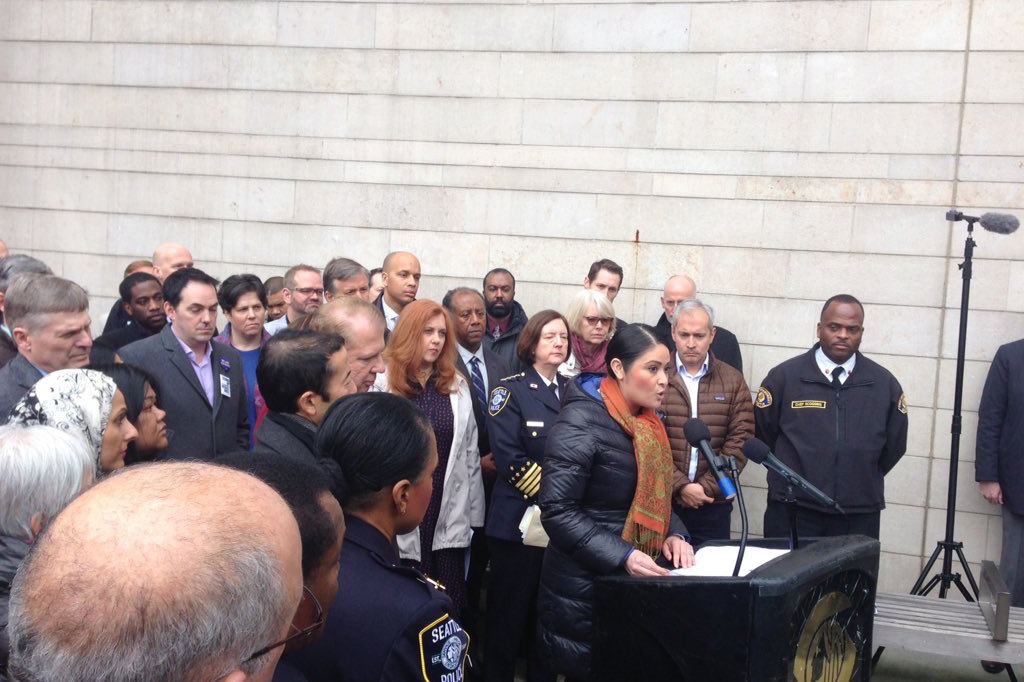Along with ordering a massive wall be built on the Mexican border and vowing to cut funding to sanctuary cities like Seattle, President Donald Trump’s executive orders issued Wednesday directed the Department of Homeland Security to publish weekly lists of crimes committed by undocumented immigrants.
Some have characterized the effort as a way to “shame” cities and counties that refuse to aid in deportations, and Seattle/King County will likely be among those shamed. Here’s why:
Whenever someone gets booked into jail, their fingerprints are taken and run through an FBI database. This database allows local law enforcement to see the person’s criminal background and whether they have any warrants out for their arrest. But entering the data in the FBI system also automatically enters it into the U.S. Immigrant and Customs Enforcement (ICE) system as well. When this biometric data matches someone ICE wants to deport, ICE will issue a “detainer” request to the jurisdiction that’s holding the person of interest. The requests essentially ask the jail to hold the person until ICE can come pick them up.
Many jurisdictions, including King County, have a policy of ignoring the requests.
As Casey Jaywork reported on Wednesday, “Per a 2014 county ordinance, county jailers are supposed to ‘only honor ICE detainer requests that are accompanied by a criminal warrant issued by a federal judge or magistrate.’”
2014 saw a spike in detainer declines to ICE. Homeland Security responded by compiling reports that keeping information on what jurisdiction declined ICE detainer requests.
Trump’s executive order instructs Homeland Security to “utilize the Declined Detainer Outcome Report or its equivalent and, on a weekly basis, make public a comprehensive list of criminal actions committed by aliens and any jurisdiction that ignored or otherwise failed to honor any detainers with respect to such aliens.”
The lists he’s ordered to be published will indicated what kinds of crimes the immigrants got arrested on, and where they got arrested. The implication, clearly, will be that were ICE allowed to apprehend these people for deportation, they’d no longer be around to commit the crimes they are committing. As Salon puts it: “Trump’s plan is part of an effort to shame sanctuary cities that ‘catch and release’ undocumented immigrants accused of crimes.”
“It’s a PR move, in part because the federal government is really limited in the kind of enforcement Trump said he wanted,” says Robin Jacobson, an associated professor of politics and government at the University of Puget Sound whose researched immigration policy extensively. She notes that many experts have argued Trump cannot cut off federal funding to cities that isn’t directly associated with immigration. But the declined detainer information is easy at hand. “Even if you are a sanctuary city, the information gets sent.”
Captain Troy Bacon with the King County Jail confirms that it is standard procedure for fingerprints to be entered into the FBI database, and that detainer requests are not honored by the jail, per the 2014 county ordinance.
Jacobson says there are many reasons that a community might not honor detainer requests.
Some jurisdictions do it as part of policy to create working relationships between immigrants and law enforcement, the thought being that if immigrants can come to police to report crimes without fear of deportation, then that will make a community safer. But others do so simply out of fear of a lawsuit; several courts have ruled that detaining someone not because of a crime they committed but because another government agency wants to get their hands on them is unconstitutional.
For King County’s part, it’s a combination of the two.
“I am very pleased with the passage of this legislation as it aligns our policies with recent federal rulings,” Councilmember Larry Gossett, the prime sponsor of the legislation, said in a press release in 2014. “Of equal importance, it maintains public safety by honoring criminal warrants, which is the norm for anyone in the criminal justice system, and moves us closer to treating all those being detained in our correctional facilities with the same level of justice regardless of their immigration status.”
Either way, the jurisdictions are well within their rights to ignore the requests. As the ACLU reports, the requests are just that, requests, and are not mandatory.
One work around to Trump’s plan, it would seem, would be to not share any arrest information with the FBI. But Jacobson, who is the former chair of Advocates for Immigrants in Detention, and favors sanctuary city legislation, says such a step is unlikely.
“I don’t foresee local agencies doing that. That would be a radical break with (law enforcement) cooperation that transcends immigration,” she says.
Jacobson argues the lists would be misguided, given that several federal courts have found that complying the detainer requests are unconstitutional.
“Holding someone when there’s no other reason to hold them beside the federal government asking could be a violation of constitutional rights. So there is a threat of lawsuit,” she says. As such, the Trump administration could arguably be shaming a city or county simply for following court orders.
On Monday, Seattle Councilmember Lorena Gonzalez will introduce a resolution in council declaring Seattle a “Welcoming City.” The resolution affirms King County’s practice of not honoring detainer requests. It instructs city employees to forward all requests to hold prisoners sent by Immigration Customs and Enforcement (ICE) to King County, since the county runs the jail. As stated above, the county does not honor the requests.
dperson@seattleweekly.com









